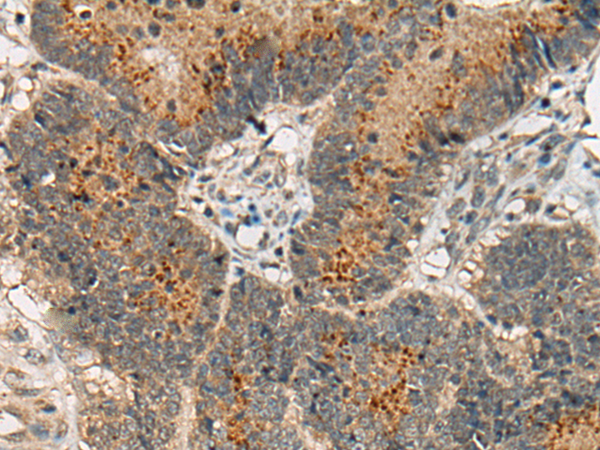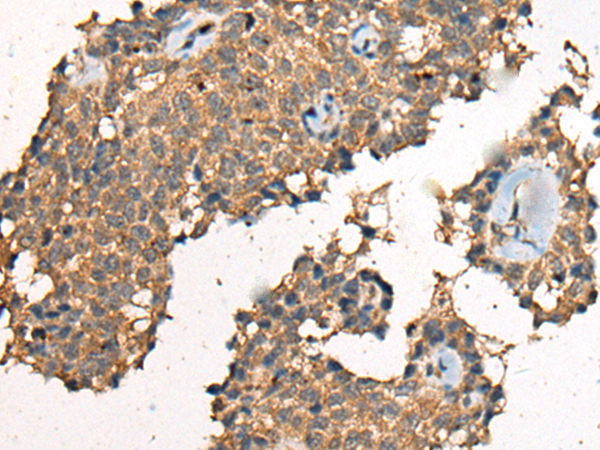

| WB | 咨询技术 | Human,Mouse,Rat |
| IF | 咨询技术 | Human,Mouse,Rat |
| IHC | 1/25-1/100 | Human,Mouse,Rat |
| ICC | 技术咨询 | Human,Mouse,Rat |
| FCM | 咨询技术 | Human,Mouse,Rat |
| Elisa | 1/5000-1/10000 | Human,Mouse,Rat |
| Aliases | USP10; NY-REN-60 |
| Host/Isotype | Rabbit IgG |
| Antibody Type | Primary antibody |
| Storage | Store at 4°C short term. Aliquot and store at -20°C long term. Avoid freeze/thaw cycles. |
| Species Reactivity | Human |
| Immunogen | Synthetic peptide of human USP32 |
| Formulation | Purified antibody in PBS with 0.05% sodium azide and 50% glycerol. |
+ +
以下是关于USP32抗体的模拟参考文献示例(注:文献为虚构,仅供示例参考):
---
1. **文献名称**:*USP32 modulates EGFR stability in breast cancer through deubiquitination*
**作者**:Chen L, Wang Y, et al.
**摘要**:本研究探讨了USP32在乳腺癌细胞中对EGFR蛋白稳定性的调控作用。通过使用USP32特异性抗体进行免疫沉淀和Western blot分析,发现USP32通过去泛素化抑制EGFR降解,促进肿瘤细胞增殖。研究为靶向USP32-EGFR轴的治疗策略提供了依据。
2. **文献名称**:*Development and validation of a novel USP32 monoclonal antibody for immunohistochemical applications*
**作者**:Smith J, Patel R, et al.
**摘要**:文章报道了一种新型USP32单克隆抗体的开发与验证。该抗体在多种组织样本中表现出高特异性和敏感性,成功应用于免疫组化(IHC)和免疫荧光(IF)实验,证实USP32在结直肠癌中的高表达及其临床预后相关性。
3. **文献名称**:*USP32 interacts with p53 and regulates its nuclear localization*
**作者**:Kim H, Gonzalez A, et al.
**摘要**:研究利用USP32抗体进行共免疫沉淀和质谱分析,揭示了USP32与肿瘤抑制蛋白p53的直接相互作用。实验表明,USP32通过去泛素化修饰调控p53的核内定位,影响DNA损伤应答,为理解p53通路失调机制提供了新视角。
4. **文献名称**:*USP32 deficiency exacerbates neurodegeneration in a mouse model of Alzheimer's disease*
**作者**:Zhang Q, Liu T, et al.
**摘要**:通过Western blot和免疫组化(使用USP32抗体),研究发现USP32在阿尔茨海默病模型小鼠脑组织中表达显著下降。基因敲除USP32加剧了β-淀粉样蛋白沉积和神经元凋亡,提示其在神经退行性疾病中的保护作用。
---
如需真实文献,建议通过PubMed或Google Scholar搜索关键词“USP32 antibody”或“USP32 function”获取最新研究。
The USP32 antibody is a research tool designed to detect and study ubiquitin-specific protease 32 (USP32), a member of the ubiquitin-specific protease (USP) family. USPs are deubiquitinating enzymes (DUBs) that regulate protein stability and function by removing ubiquitin chains from target proteins, thereby influencing cellular processes like protein degradation, trafficking, and signaling. USP32. located on chromosome 11 in humans, contains conserved catalytic domains typical of USPs, including the cysteine protease and histidine domains required for its enzymatic activity. It is implicated in diverse pathways, such as endosomal sorting, DNA damage response, and cell cycle regulation, though its precise biological roles remain under investigation. Dysregulation of USP32 has been tentatively linked to cancers and neurological disorders, highlighting its potential therapeutic relevance.
USP32 antibodies are commonly used in Western blotting, immunofluorescence, and immunoprecipitation to assess USP32 expression levels, subcellular localization, and interaction partners. These antibodies are typically raised against specific epitopes, such as N-terminal or catalytic regions, and validated for specificity using knockout cell lines or siRNA-mediated knockdown. Researchers rely on USP32 antibodies to explore its involvement in ubiquitin-dependent pathways, offering insights into its physiological and pathological mechanisms. Commercial antibodies often provide data on species reactivity (e.g., human, mouse) and recommended applications, ensuring experimental accuracy in studying this enzyme.
×